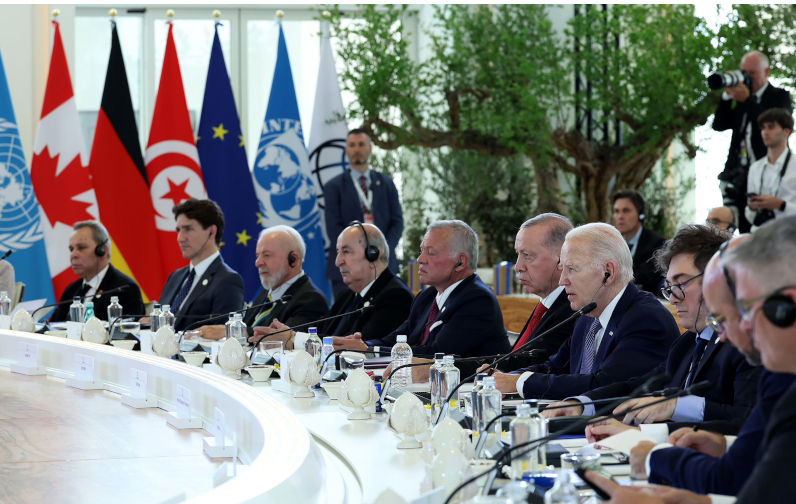The aimlessness of the G7 on Ukraine only delays the inevitable
June 21, 2024
At some point there must come a crisis. The G7 and their allies and partners will either have to cease their support for Ukraine as the toll and costs become too great, or decide that the defeat of Russia is of such importance to them collectively that they engage militarily in the conflict.
It would have been simple enough for the G7’s leaders’ communique to say plainly that they will continue to support Ukraine until its pre-2014 borders are reestablished. What the world got was the familiar refrain that the G7 reaffirms its “unwavering support for Ukraine for as long as it takes”. Takes to do what? Fine sounding phrases about “respect for Ukraine’s sovereignty and territorial integrity” tell us nothing about the strategic objectives the G7 countries have for this war.
The communique was a 60 page dump by a group of fading post-colonial states pretending they still retain the power to shape the global environment. Based on purchasing power parity (PPP), the seven biggest economies in the world would now include China, India, Russia, and Indonesia. (None of which signed up to the so-called Swiss Ukraine peace conference outcomes either.)
Hat aside, the communique’s section on the Ukraine war remains opaque as to the strategic policy aims of the G7 group. Their expectation might be revealed in the reference to ”in the face of a prolonged defence against Russia”. The war aims might have been weakly and indirectly implied in their call for “China to press Russia to stop its military aggression and immediately, completely and unconditionally withdraw its troops from Ukraine.”
The communique states that “Our ultimate goal remains a just, lasting and comprehensive peace in line with international law and the UN Charter and its principles and respect for Ukraine’s sovereignty and territorial integrity”; but the battle is on the ground in Ukraine. For how long and at what cost will the G7 nations envisage continuing to facilitate Ukraine’s war against Russia?
Until Russia is forced back militarily behind the 2014 borders, including the abandonment of Crimea? Until Russia is exhausted by the war and seeks a negotiated settlement? Or until Ukraine has depleted its human and economic resources to the point that even with G7 country support it cannot continue?
Ukraine’s demographic deficit and its inability to fund government activity only compound the problem.
Pre-war Ukraine was already experiencing an acute birth crisis and high emigration. Between 1993 and 2021 Ukraine’s population dropped from 52 million to around 43 million, and since the invasion another 6 - 7 million has been lost from migration, and a similar number now live in Russian-controlled territories. An estimated 650,000 men of fighting age have already evaded military service by moving to the EU.
As of last winter the World Bank estimated the cost of Ukraine’s reconstruction to be US$ 486 billion. This number will grow quickly as the war continues. For 2024 Ukraine’s budget requirement is US$ 87 billion (half for defence) and expected tax revenues only US$ 46 billion. The G7 is intent on making up Ukraine’s fiscal shortfall; a fiscal gap which will widen as the war drags out while at the same time the Ukrainian personnel available to fight the war declines.
There is a certain aimlessness descending on the Ukraine war; the discourse in the endless talkfests on Ukraine seem disconnected from reality. Underneath the increasingly insistent talk of support for Ukraine lies a lack of clear strategic objectives and no sign of an envisioned end-state.
Military force is a blunt instrument and war is capricious, but it is also an unavoidably practical undertaking. There is no metric for success or failure, or even of progress, in a war in the absence of a strategic policy objective.
EU Commissioner Ursula von der Leyen has said that in Ukraine “It is the question whether democracy will be stronger or if it is autocracy that will dominate”. Whether it is “the right of might dominating or whether it is the rule of law” that is at the centre of the war. Therefore, she maintains, Ukraine is fighting for Europe.
Defending democracy or defeating autocrats are not strategic policy objectives. Although such slogans might in fact identify who the adversary is and why they are an adversary, they don’t specify what is to be achieved. So how will our leaders know when the Ukraine war is won or if any victory will be Pyrrhic?
Is the objective to retake all the ground that Russia has now incorporated into its federation, notwithstanding that Russia’s defensive lines are still sound and the prospect of a successful Ukrainian offensive unlikely? From Putin’s perspective to now surrender lands he has formally declared to be part of the Russian federation would be a move from which he would be unlikely to recover politically, or to even contemplate.
For Ukraine to have to give up sovereign territory to Russia’s invasion would be undesirable on many levels. It is difficult to conceive of the depth of the political and economic turmoil on the border of Europe in a truncated Ukraine after such a capitulation; whether through a frozen conflict or a peace settlement. Equally, it is worrying to contemplate a defeated Russia, humbled and hostile, lurking with intent just over Ukraine’s 2014 borders. Neither scenario is attractive. The reticence of the G7 to entertain publicly either option is understandable.
Maybe in the dark recesses of the Pentagon or in the need-to-know files in the National Security Council bunker there is a well-thought out plan that charts the course of the war toward some clear outcome. If so, it’s well concealed. From outside it looks like the plan is to keep propping up Ukraine and hope something good happens.
However, as they say in the business, hope is not a strategy.
Continued indecisiveness by the G7 will only destroy its credibility and stress Europe’s unity and economy.

